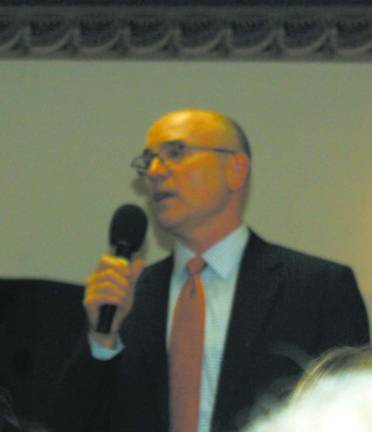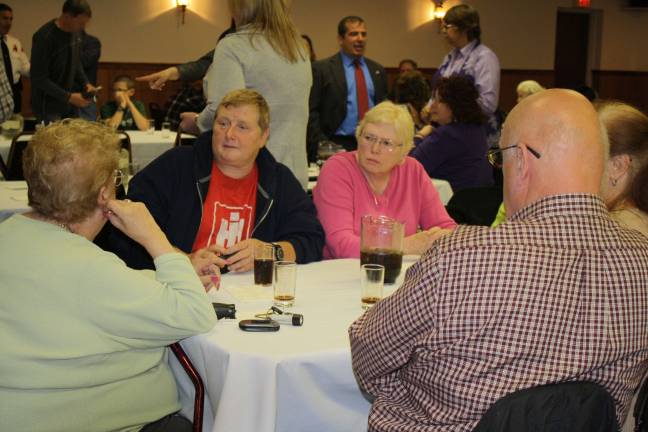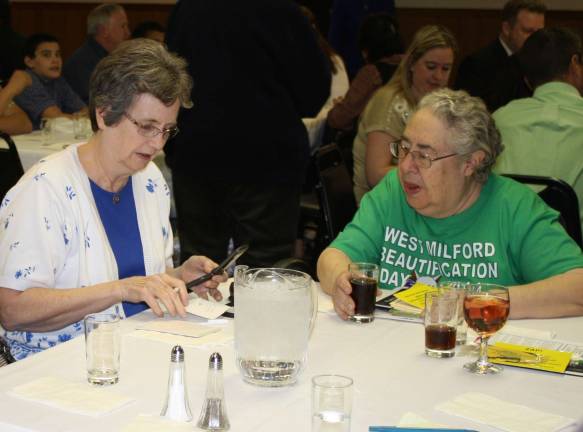C.A.S.A. opens some eyes




BY LINDA SMITH HANCHARICK
WEST MILFORD — There is an "explosion" of heroin use throughout the suburbs of New Jersey and West Milford is in the thick of it.
That is the opinion of Superior Court Judge Rudolph Filco, who had overseen Passaic County's Drug Court for over three years and the juvenile drug court before that.
Filco spoke at West Milford's Community Against Substance Abuse (C.A.S.A.) dinner Monday night about the Drug Court, its purpose and some staggering numbers about drug use throughout the county and in particular in the suburbs.
"There is an explosion (of heroin) throughout the suburbs," said Filko. "And if I had a top 10 list, West Milford would be number one."
He explained that out of 21 communities in Passaic County, three are urban and the rest are considered suburban, like West Milford. He currently sees about 500 participants in his court. Forty percent of the participants in his Drug Court are from the suburbs. Of that number, 25 percent are from the Township of West Milford.
"Many applicants are from West Milford," he said. "That's a lot."
West Milford is no different from any other community, he said. This problem is everywhere and he sees it every day.
What is Drug Court?
Drug Courts are alternatives to traditional criminal courts, according to the state's Web site. They are geared toward the non-violent drug offenders and the goal is to get them treated for their addiction in order to end the criminal activity.
Passaic County Drug Court has been in existence since 1998.
Filco, who has been part of the Drug Court for the past seven years, sees the stories and the patterns. He reads their histories.
"The pattern is drug use, crime, out; drug use, crime, out. You treat the addiction and then stop the criminal activity."
There are two criteria to be considered for Drug Court: commit and be convicted of a non-violent crime and be drug or alcohol dependent.
"It's a shame we can't be more proactive before they commit the crime," Filco noted.
Potential participants go through a detailed evaluation to get into the program. Filco sees their stories - when drug use started and how it progressed. And he certainly sees the patterns. He is a believer in Drug Court, not just because of the cost - it is one third of the cost of sending someone to prison - but also because of the result.
The program is tough. Participants are sent to residential rehab for six months, then graduate to a halfway house. Even when that's done, there are spot visits, random drug testing three times a week, Drug Court appearances and probation once each week. But they learn to put their lives back together.
Hopeful testimonials
Filco brought with him four members of his Drug Court, young people who have gotten their lives back because of the rigid program and several with ties to West Milford. What's noteworthy is that they don't fit any stereotype; they come from different socioeconomic backgrounds, have different personalities and interests. One was an athlete from a very loving and stable family; another was a young woman with low self esteem from a dysfunctional home; one was a talented, well-rounded "A" student from an involved, caring family; another had seen his share of getting in trouble as a kid but still had the support of his family.
Three of them grew up in West Milford.
Adam
Adam grew up in Pequannock. Wearing a plaid, button-down shirt and a wedding ring, he told the group that he started experimenting with alcohol before he even entered high school. As a football and baseball player, he fit in with the older kids once he got to high school by partying with them on weekends after games. He was always interested in the next thing to do. He progressed from alcohol to smoking pot, then onto pills and cocaine. But he was still able to maintain his grades. He went to Penn State, "one of the best tailgating schools in the country," he said. With no parental supervision, his partying no longer was limited to weekends. Eventually, he stopped going to class and failed out of school.
When he returned home, he got a decent job but hung out with his old high school friends who were doing drugs. One night, after a night of drinking, a friend introduced him to heroin. It was the first time he snorted heroin and it eventually led to a nearly 50-bag-a-day habit.
"I grew up in a household of morals. You don't steal, you don't lie," Adam told the hushed crowd. "With an active addiction, nothing matters. I stole from everyone in my family. I stole my 5-year-old niece's piggy bank."
He ended up roaming the streets of Paterson and was eventually arrested for burglary. That's when he ended up in Filko's courtroom.
"It was almost a sigh of relief," said Adam.
He was clean two years in February. He attends Narcotics Anonymous meetings, which he credits with teaching him how to live again. He is married now and has a child of his own, which has brought him new insight into life.
"Being a parent now, I can picture a little bit what my parents went through," he said. "It makes me feel terrible. I'm probably the best I've ever been to my parents now."
Kelly
"I came from a family of addiction," said this pretty, composed young woman. She didn't have the family stability that some of the other speakers had. She and her sisters had to fend for themselves a lot while their single mom bartended to support them. She never had much, materially or by way of support.
"I could never just be a kid," she said. She suffered from anxiety and low self esteem; her family bounced around a lot. Her family moved to West Milford when she was 14. Drugs helped her suppress her pain. She started drinking at 13 and using opiates at 17. Eventually, she even did drugs with her mother and her mother's friends, one of which introduced her to opiates. She became dependent on oxycontin and eventually started crushing and snorting it because taking it orally just didn't work for her anymore.
She was introduced to heroin after going to Paterson to by "oxy" which she was going to sell to support her habit. A girl there turned her on to heroin. Soon, she was sniffing three bags just to get up in the morning.
"I did things I never thought I'd do," she said.
Including burglary. She lived with a boyfriend who was also on heroin. He had inherited a large sum of money that kept them steeped in their addiction. But the police were looking for her because of not appearing in court. They came to her door one day and she hid. They were finally ready to leave - she heard one say to another that no one is home - when she had a change of heart.
"Something came over me. I believe in my heart it was God," said Kelly.
She ran to the door and let them take her. She ended up in Filko's Drug Court, went to six months inpatient, then a halfway house.
"It's was the first thing in my life I ever completed the right way."
Her grandma, a recovering alcoholic, is her role model and her strength. Se's been sober for over 30 years and became a nurse.
Clean since Sept. 16, 2011, Kelly said her life is amazing now.
"I lacked guidance my whole life," she said. "These programs are amazing. My self respect, self esteem is incredible."
And, she said she has forgiven her mom.
Dan
Drug Court is the best thing that ever happened to Dan, a young man who grew up in West Milford.
"I got into trouble ever since I could remember," said Dan to the group, not going into too much detail.
Four years ago, he was recommended for Drug Court. He is grateful for that.
"I've seen a lot of my good friends die," he said.
While in the program, Dan said he worked on himself. He learned to trust others and value himself.
"The trust I have with my family is ridiculous now," he added. He said he helps around the house just to help. He's not looking for any payment, unlike the way he was before.
He works outside, something he said that's good for him.
"I have a great job in West Milford. I work outside. The cops actually wave to me now," he said with a chuckle. Before he came to the C.A.S.A., Dan said he asked his mom what he should say in his talk. His mom's advice, he said, was this: "Search kids before they leave; ask where they're going; know their friends' parents. It really can save a life."
Kristen
Kristen grew up in West Milford and said she had a "really good childhood." She attended Catholic school, had great parents and grandparents. She played flute, ran track and played basketball. In high school, she started drinking. She tried cocaine but didn't like it. At 16, Kristen said she started taking oxycontin.
"That took over my life," she said.
Still, she managed to maintain a near flawless GPA. She graduated high school and went away to college, where she still kept up her grades. For a while. She came home almost every weekend. Then she started heroin. Her GPA went from 3.9 to failing.
She left school, came home and enrolled in Passaic County Community College, "just to be closer to my drug of choice."
At the height of her addiction, Kristen was doing "a brick" of heroin a day. That's 50 bags. At $5 a bag, her habit was costing her $250 a day.
"I robbed from everyone. My mother, father, my really good friend's house," said Kristen. "My family really tried to help me."
Kristen spent seven days in Passaic County jail for robbery. She was bailed out with the condition she would go to rehab. Kristen didn't like people to tell her what to do; her personality came through in her talk. She's feisty. She said she went on the run to avoid her problems and she tried to stay clean.
"But I wasn't ding it for me," she said. "It was for my family."
She relapsed but she maintained a job that was bringing in $1,000 a week. The West Milford police caught up with her one day when she was pulling out of her driveway with flat tires.
Kristen said she fought everything. She was accepted into Drug Court and sent to a program in Atlantic City for six months. She even argued about that.
"It was one of the best things that ever happened to me," she added. "It was great being so far away for so long."
Kristen said she didn't like herself. Despite her talents, her smarts and athleticism, she didn't see what others saw.
Finally, she was accepting the help being offered. Now she's clean for more than a year. She works hard and loves the people she lives with at the halfway house.
"I live in a house with 16 girls, all different personalities. We're all struggling with the same thing, battling the same thing. Today, I have women who are my best friends."
And, she said, there's something new.
"I'm doing something I never did before. I'm taking suggestions. I'm not fighting everyone."
Parents be aware
Filko said that while most of the heroin in the area is coming from Paterson, everyone using isn't going to Paterson to get it.
"It's being sold right here," he said. "A lot are going to ShopRite parking lot. They're buying them here."
He warned the parents in the room to watch closely their pills. "You've got to watch what you have in the house. Unused opiates - get rid of them. I read the histories. Most start with pills."
But, he warned, they all start off with alcohol. It's in almost every house.
Filco said he has photos of each of his Drug Court participants on the day they start and when they're done.
"It's mind boggling," he said, of the difference in the two.
For Kristen and Dan's stories, go to westmilfordmessenger.com.
Do you have a story to tell? Go on our Web site and share it with us.